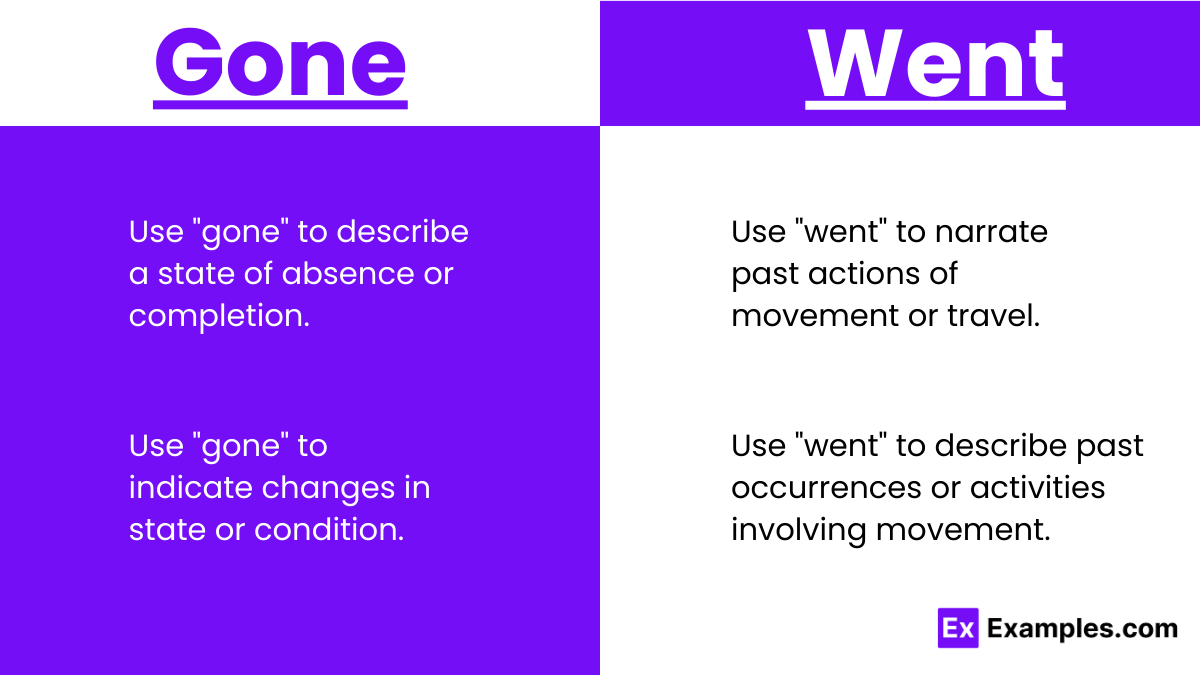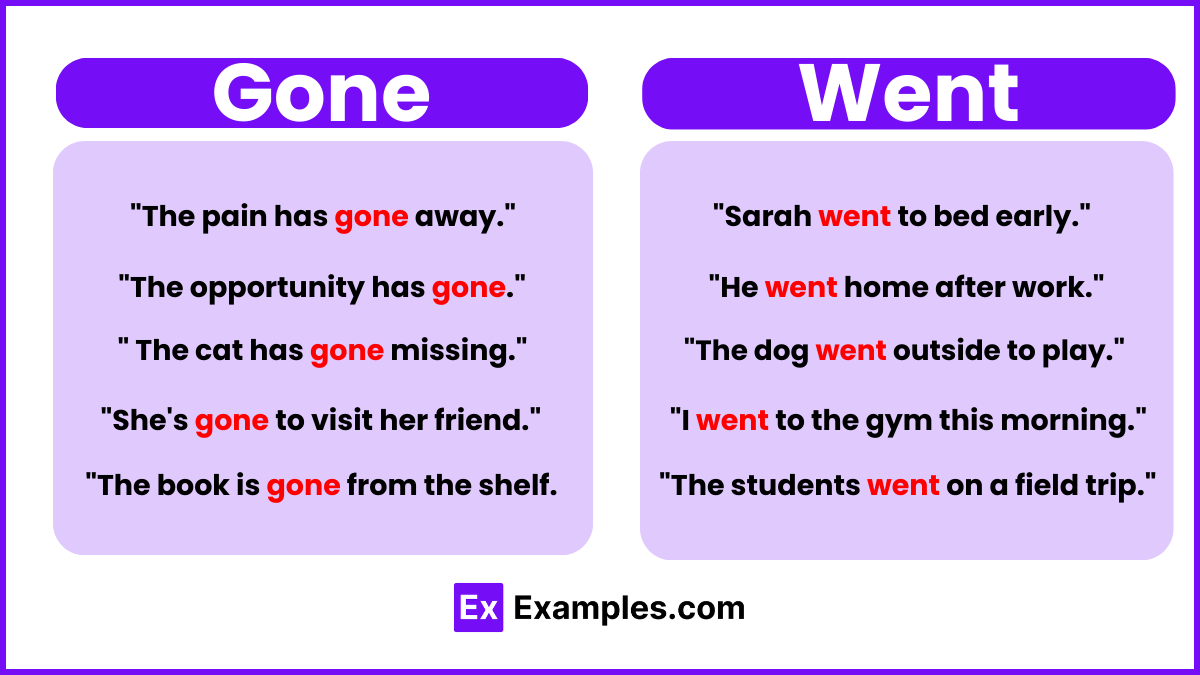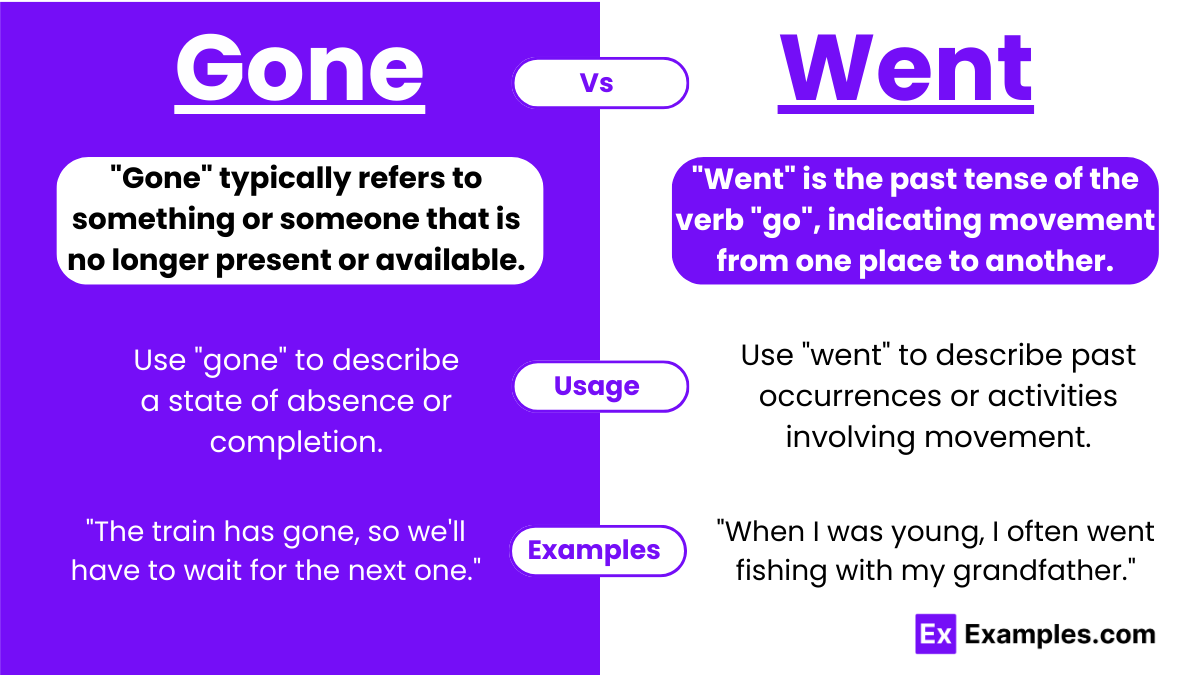Gone vs Went – Meanings, Differences, Usage, Examples
Understanding “gone” and “went” in English is like knowing different roads in a game. “Went” is what you use when talking about going somewhere in the past, like “I went to the store.” “Gone” means something or someone is not here anymore, like “She’s gone to the party.” They’re both about going, but in different ways. So, when you use them, you’re telling a story about where things are or were.
Gone vs Went – Meanings
- Gone: It is the past participle of the verb “go.” It indicates the action of leaving or moving away from a place or situation. “Gone” is used to describe a state of absence or departure.
- Went: It is the past tense of the verb “go.” It signifies the action of moving from one place to another in the past. “Went” specifically refers to the act of traveling or moving from one location to another.
Summary
How To Pronounce Gone and Went
- Gone: Pronounced as /ɡɒn/.
- Went: Pronounced as /wɛnt/.
Differences Between Gone and Went
| Aspect | Gone | Went |
|---|---|---|
| Tense | Past participle of “go” | Past tense of “go” |
| Formality | More formal | Less formal |
| Examples | She has gone to the store. | She went to the store. |
| Completion | Indicates completed action | Indicates an action in the past |
| Active/Passive | Can be used in both active and passive constructions | Primarily used in active constructions |
| Continuous | Cannot be used in continuous tenses | Can be used in continuous tenses |
| Progressive | Cannot be used in progressive tenses | Can be used in progressive tenses |
| Emphasis | Often used for emphasis or duration | No specific emphasis implied |
How to Remember the Difference Between Gone and Went
- Gone for Absence: Remember “gone” for indicating absence or completion, just like someone or something has “gone” away.
- Went for Past Travel:Recall “went” for narrating past travels or movements, as in “where did you go yesterday?”
- Visualize the Context:Picture “gone” as a state of absence, like an empty chair, and “went” as the action of physically moving from one place to another.
When To Use Gone and Went

Usage of Gone
- Indicate Absence: Use “gone” to describe a state of absence or completion, such as “he has gone to the store.”
- Express Completion: Employ “gone” with auxiliary verbs like “have” or “has” to denote completed actions, as in “she has gone home.”
- Denote Changes: Use “gone” to indicate changes in state or condition, as in “the cake is gone.”
Usage of Went
- Narrate Past Actions: Use “went” to narrate past actions of movement or travel, as in “they went to the beach yesterday.”
- Describe Specific Travels: Employ “went” to specify past journeys or trips, as in “she went to Paris last summer.”
- Indicate Past Events: Use “went” to describe past occurrences or activities involving movement, as in “we went for a hike in the mountains.”
How To Use Gone and Went
Gone
- Use “gone” when indicating completion or absence, often with auxiliary verbs like “have” or “has.” For example: “She has gone to the store.”
- It can also denote changes in state or condition. For instance: “The cake is gone.”
Went
- Use “went” to narrate past actions of movement or travel. For example: “They went to the beach yesterday.”
- It specifically describes past journeys, trips, or activities involving movement. For instance: “He went for a walk in the park.”
Gone and Went – Examples

Gone Examples
- She has gone to the market to buy some groceries.
- By the time we arrived, he had already gone home.
- The train has gone, so we’ll have to wait for the next one.
- He’s gone to the doctor for his check-up.
- Have you seen my keys? They seem to be gone.
Went Examples
- Yesterday, we went to the beach and had a great time.
- She went to Paris for her vacation last summer.
- He went to the store to pick up some milk.
- They went hiking in the mountains over the weekend.
- When I was young, I often went fishing with my grandfather.
Synonyms for Gone and Went
| Gone | Went |
|---|---|
| departed | traveled |
| vanished | proceeded |
| absent | journeyed |
| out of sight | advanced |
| disappeared | moved |
| away | departed |
Why do people commonly confuse gone and went?
- People confuse “gone” and “went” because they’re both forms of the verb “go.”
- “Gone” is used to indicate completion or absence, often with auxiliary verbs like “have” or “has.”
- “Went” is specifically used for past actions of movement or travel.
- Their irregularity and similar meanings contribute to the confusion between them.
- In spoken language, the distinction between “gone” and “went” may not always be clear, adding to the confusion.
Exercises
- She ___________ to the market to buy some fruits.
- The bus ___________ already; we missed it.
- He has ___________ to his friend’s house for dinner.
- The opportunity has ___________; we should have acted sooner.
- They ___________ on a vacation to Europe last year.
Answers
- went
- went
- gone
- gone
- went
FAQ’S
Difference Between “Have Gone” and “Have Went”
“Have gone” is correct as it’s the present perfect form of “go.” “Have went” is incorrect; “went” is the past tense.
“Gone” or “Went” – Which Is Correct?
“Gone” is correct for completed actions, while “went” is past tense. Example: “She has gone to the store” vs. “She went to the store.”
Difference: “He Has Gone” vs. “He Went”
“He has gone” refers to a completed action with present relevance, while “he went” denotes a past action without present connection.
Difference Between “I Went” and “I Had Gone”
“I went” is simple past tense, referring to a past action. “I had gone” is past perfect, indicating an action completed before another past event.
Can I Say “I Was Gone”?
Yes, “I was gone” can be used to indicate absence or departure. Example: “While you were away, I was gone for a week”.


